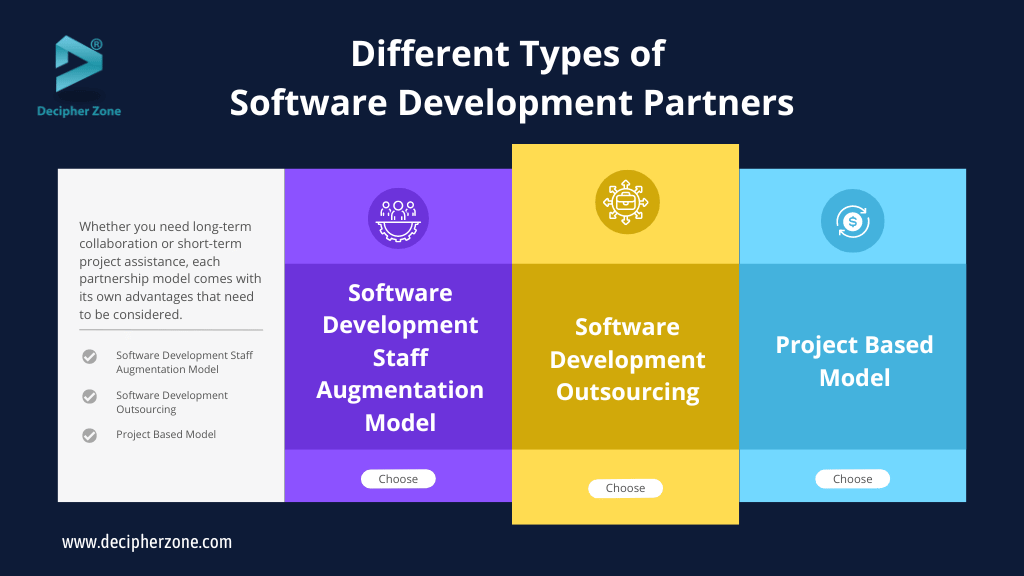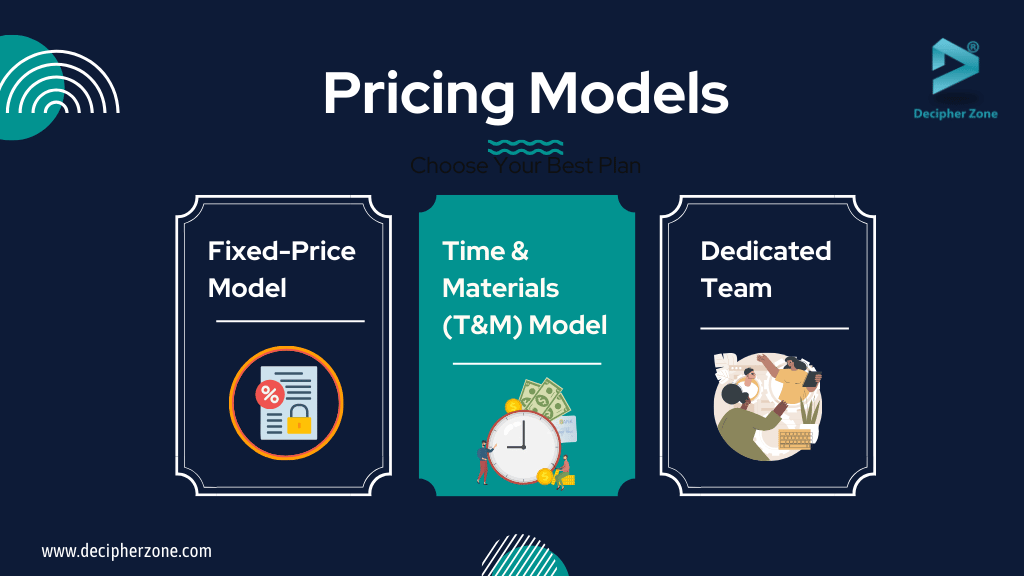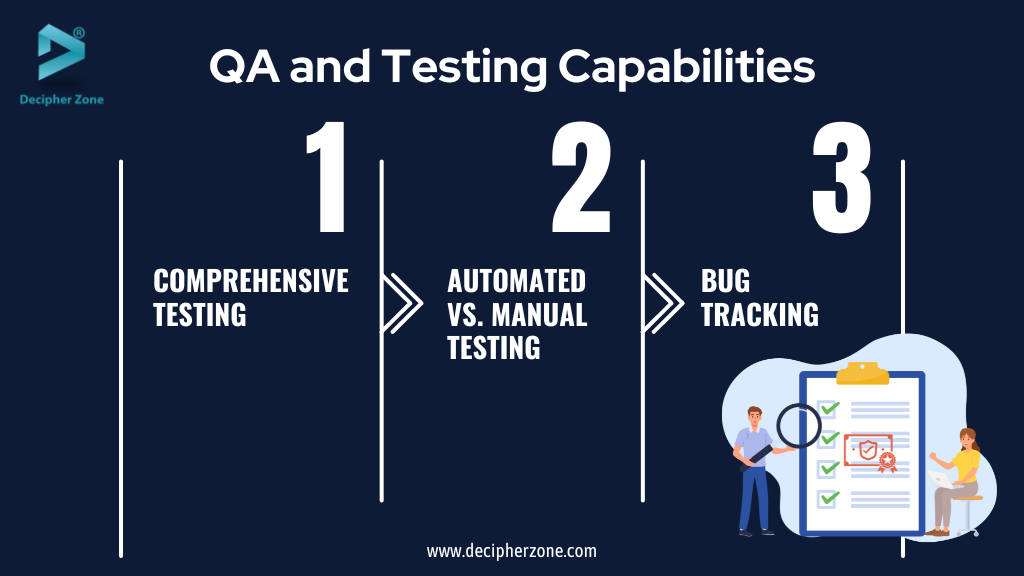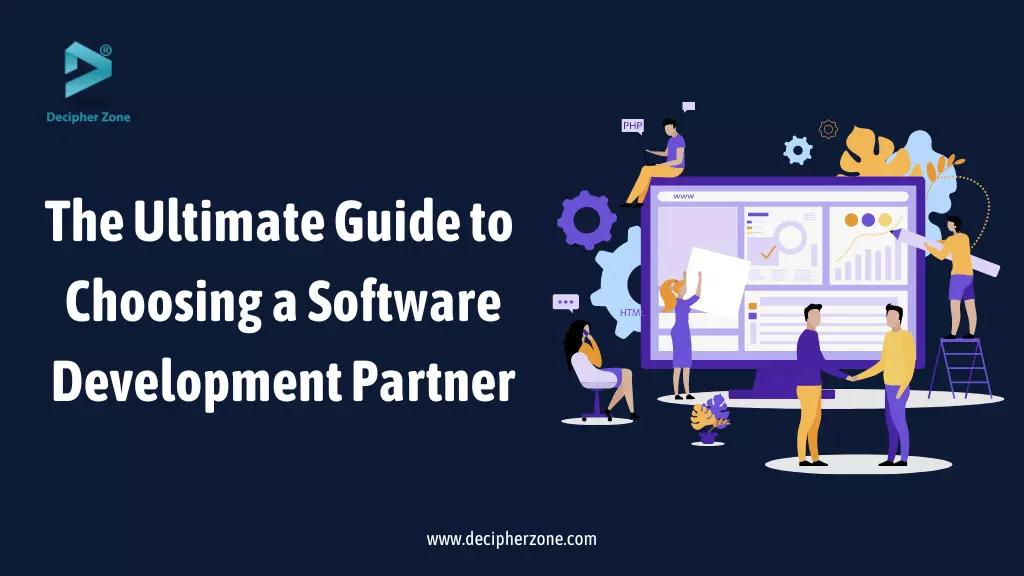Choosing the right software development partner isn’t easy yet this guide not only helps you find the best but the most suitable software development partner tailored to your needs. It covers the steps of choosing the ideal partner, how to identify your needs, budget, and tech stack, and what mistakes to avoid.
Each industry faces competitiveness, so staying ahead for your business is essential. No business can do it yourself or if you do, you won’t be able to focus on more important tasks- managing your company operations.
This is why, choosing the ideal software development partner is crucial including your company’s reputation and growth depending on the quality and suitability of the final deliverables. And we get it, which is why we are here to lower your burden.
Your Learning Journey:
-
What are the steps to choose the right software development partner,
-
How and what to evaluate as a business partner,
-
What are the different types of software development partners,
-
How to identify the experience and expertise of the shortlisted partners,
-
How to identify the budget and cost,
-
How to assess the partner's technological aspects,
-
What are the phases of quality assurance and testing done by the software development partner,
-
What post-development services do the partners offer,
-
How to check the client references and testimonials of the partners,
-
How to assess the project management abilities of the partners,
-
What mistakes or red flags to avoid while choosing a software development partner,
-
What to consider while making the final decision.
Steps to Choose the Right Software Development Partner
Choosing a software development partner might seem straightforward until you encounter the complexities, potential delays, and the occasional unexpected challenges. But don't worry - we're here to help! We'll walk you through the steps to choose the perfect software development partner.
Understanding Your Business Needs
Before you begin the hunt for the ideal software development partner, you need to identify your needs. A few things to consider are your objectives, goals towards the project you want to build, what you are looking for in the software development partner, timeline, and budget.
Or what you can do is, You can answer these questions below, these answers will be your ideal requirements.
-
What specific need does your software require or aim to address?
-
What key features and functionality are required in the software?
-
Who are your target audience for the software?
-
What are the technical and compatibility requirements for your software?
-
In what duration do you desire the project completion and launch?
-
What are your budget and cost estimations for the software development project?
-
Are there any rules or compliance requirements that need to be adhered to?
-
What are the success criteria or metrics for evaluating the effectiveness of the software?
-
Does the software need to integrate with any existing systems or data?
-
How will ongoing maintenance and support be handled after the software is launched?
With these questions answered you have almost reached an understanding of your business requirements.
Different Types of Software Development Partners
Whether you need long-term collaboration or short-term project assistance, each partnership model comes with its own advantages that need to be considered.
Ready to meet the different types of software development partners? Spoiler alert: there's more than you think.

1. Software Development Staff Augmentation Model
This model allows to you hire IT specialists or software developers on a temporary basis which brings in outside expertise apart from the team to help you complete the project.
How It Works
The augmented staff integrates into your in-house team and will adopt your work processes, policies, and management tools acting as an extension of your company.
Benefits
-
Flexibility,
-
Expertise On-Demand,
-
Cost-Effective.
Businesses that are looking to meet deadlines or for expertise in specific projects but have an in-house development team opt for such a model.
2. Software Development Outsourcing
Outsourcing a company involves contracting software development activities to a third-party company that handles almost all the aspects of the development process from designing to coding to testing and deployment.
-
How It Works
The third-party firm takes full responsibility for your project’s development and assigns a development team including developers, project managers, and QA professionals to manage the project and provide the final delivery from scratch.
Benefits
-
Budget Friendly,
-
Proficient development team members,
-
Focus on Core Business,
Businesses that are more involved in marketing, sales, and customer service prefer to opt for such a model as they don’t require an in-house development team.
3. Project Based Model
With this model, some experts are involved and responsible for the delivery of the specific project based on your specifications.
How It Works
The freelancer handles the project from the beginning until the final product is delivered; you have no control over the day-to-day activities but receive regular updates and feedback on progress from them.
Benefits
-
Quick and More Efficient Completion of Project.
-
Well-suited, Clear Requirements, and Well-Defined outcomes,
-
Time Efficient,
-
Optimal Results.
Businesses that want to hand over the complete solution, especially when internal resources are limited, would prefer a hands-off approach and opt for such a model.
Evaluation of Experience and Expertise
Up to this point you might have evaluated your requirements, and what model you are looking for tailored to your business. Once you have shortlisted a few potential partners, you can assess further, considering their experience and technical expertise.
1. Industry-Based Experience
The proficient knowledge of the software development partner can offer significant advantages and are more likely to understand the unique requirements, rules, regulations, and challenges that are especially important to your sector. Here are key elements to judge:
-
Check for industry-specific projects, for example, if you’re in the finance industry, a partner with expertise in handling projects compliant with regulations like GDPR or PCI-DSS would be highly beneficial.
-
Look for case studies or project completion stories that they have developed for different companies in your field. This will help you assess whether they have a clear understanding or not.
-
Software development partners can help you navigate industry challenges and offer insights into best practices to meet both your business goals and industry standards.
2. Technical Expertise
The complexity of hiring a software development partner is that they have a deep knowledge of tools, technologies, and programming languages to assess their technical proficiency. Here are the key elements to judge:
-
Ask questions like “What programming languages and technologies do they specialize in? How much experience do they have with the specific tech stack your project requires? Can they adapt to new technologies if necessary?”
-
Ask if they can handle project unique technical requirements whether it involves web development, mobile app development, eCommerce, or AI/ML integration.
-
Ask if they have worked on similar to your project in terms of scope, functionality, and technology. And if necessary will they be able to handle the challenges of your project?
Budgeting and Cost Considerations
Based on an analysis of the current market rates and your specific project requirements, you can establish a suitable budget. Also, there are various pricing models available for engaging software development partners, allowing you to choose the most suitable option for your needs. Here are the key considerable models to keep in mind:

1. Fixed-Price Model
This is the basic pricing model where the development partner provides a set price for the entire project, including requirements and timelines. Any changes or additional features may lead to extra charges.
2. Time & Materials (T&M) Model
This model estimates the price on the basis of the actual time and resources spent on the project, offering adaptability. But, it can result in higher costs if the project scope expands over time.
3. Dedicated Team
This model requires a dedicated team to be hired on a monthly or hourly basis, paying them for their time and expertise. Careful management is necessary to avoid unnecessary long-term costs.
Assessing Technology Stack
As discussed earlier about the technological experience of software technology partners, the combination of programming languages, frameworks, databases, and tools are all paramount to seamlessly build a software solution.
It is critical to ensure that a development partner not only has experience with the tech stack but also with software development methodologies. Different companies may follow different approaches to software development and technology/ methodologies which impact the flow and efficiency of the project.
To keep the project on track with clear timelines, milestones, and deliverables, a well-defined project management approach is a must. You can visit the blog “Different Software Development Methodologies” to learn the details of popular software development methodologies to relate to your project.
QA and Testing Capabilities
Quality assurance and testing processes ensure that the working of the solution meets the quality standards and performs reliably overall. Stick around to find out if your software development partner's QA process is up to par—or if it's just smoke and mirrors.

-
Comprehensive Testing: The software development partner should provide the details of what are the phases of conducting testing at each stage of development and check the functionality, performance, and usability.
-
Automated vs. Manual Testing: As testing is a continuous and lengthy process, the combination of manual and automated testing can be the most efficient approach where automated testing can quickly identify repetitive issues on large codebases and manual testing focuses on the user experience and specific interactions.
-
Bug Tracking: Understand how the software development partner tracks and resolves bugs, what bug tracking tools they use, and how they prioritize and address issues during the development and after launch.
Post-development Support and Maintenance
Think launching is the finish line? You've just unlocked the never-ending game of updates, bug fixing, and 'oh, we’ll just add this one little feature.' The software development partners need to be assured of post-launch support and maintenance services and what more to look for. Here are a few questions to evaluate the right software development partner:
-
How fast do they respond to the issue that arises once the software is live?
-
What preventative measures do they implement to ensure that the issue will not arise again in the future?
-
What security protocols and updates do they follow to protect the software from new threats?
Client References and Testimonials
In the process of choosing the right software development partner, you can check for client references and testimonials as they give insights into the quality of their work, communication, and overall client satisfaction.
While contacting references, here is the list of questions that will provide a clear understanding of the software development partner:
-
How satisfied were you with the quality of the final product?
-
Did the software development partner meet project deadlines and stay within budget?
-
How well did the software development partner communicate and manage expectations?
-
Are the software development partners able to adapt to changes or challenges during the project?
-
Will you consider making them again as a partner, why or why not?
Red Flags to Avoid When Choosing a Software Development Partner
Before committing and reaching a decision on a software development partner, it is important to spot and notice the red flags as early a s possible to avoid any future problems. Identifying red flags during the choosing process and avoiding them is crucial. Here are some key warning signs to look for:
-
Lack of transparency,
-
Pressure to commit early,
-
Inadequate and inappropriate responses,
-
Poor accountability,
-
No clear updates,
-
Inconsistent communication,
-
Few client reviews,
-
Overpromising,
-
Too many projects at once,
-
No post-launch support plan,
-
Hidden costs,
-
Poor collaboration tools,
-
No previous industry experience.
Final Decision Making
After reviewing and evaluating all the potential software development partners, now you can choose the right companion by trusting your guts and the information you gathered.
While considering the decision you can follow these instructions, helping you not to miss anything important.
-
Review All the Data: Look back on all the research, client references, and interactions you’ve had with each shortlisted software development partner. Take note of who has been the most transparent, responsive, and aligned with your business requirements.
-
Consider Compatibility: Beyond technical skills, assess how well the partner fits with your company’s culture, values, and communication style.
-
Expertise and Experience: Ensure the partner not only has the technical capabilities but also relevant industry experience and a proven track record in similar projects.
-
Balancing Cost and Value: While budget is a crucial factor, don’t just go with the cheapest option. Consider the overall value the partner can bring, including long-term support, quality assurance, and post-launch services.
-
Evaluate Long-term Commitment: Choose a partner who is committed to building a lasting relationship, providing ongoing support, and being there for you as your software evolves.
-
Trust Your Gut: Ultimately, trust your instincts. If a partner has checked all the boxes but something still feels off, it’s better to move forward with one that gives you full confidence.
How Decipher Zone Can Help?
Successful partnerships depend on smooth collaboration, and that's where Decipher Zone excels. As a leading company, we offer a range of services, including software development outsourcing, custom software development, and industry-specific software development. Our team consists of skilled developers with extensive experience in the field.

FAQs
1. How do I know if a development partner is the right fit for my project?
It’s important to look for software development partners who are working on a similar project to yours which clearly shows that they have the knowledge and skills. Also, you can review their portfolio, industry-based knowledge, and technical expertise. With this, you will be able to pick the most suitable software development partner for your business.
2. What are the most important criteria to consider when choosing a software development partner?
There are many factors to consider when choosing the right software development partner including experience, technical capabilities, market experience, pricing models, post-support launch, past projects, etc.
3. How to choose the right software development partner?
Every software development partner operates differently, and each one will have a different project cost. Be sure to conduct thorough research to ensure that the company has experience using the technologies required for your project, uses a pricing method that suits your needs, can complete the project within your desired timeline, and has a track record of successful projects.

